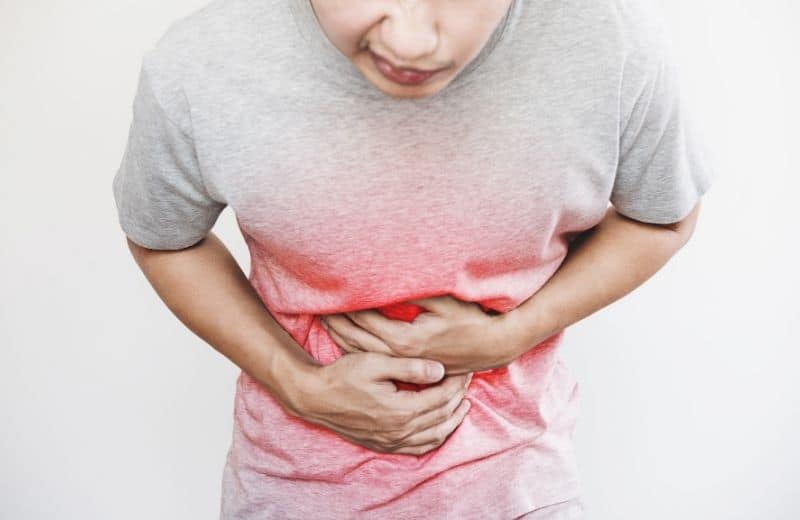Stomach aches are annoying, and even mild upset can make you feel nauseous and unable to concentrate on your tasks. Do you want immediate relief and looking for home remedies for stomach pain?
You are in the right place, continue reading. Stomach pain is widespread, and everyone experiences it at some times. Maybe you have eaten something wrong, which is causing food allergy and indigestion, or more commonly, it may be just a trapped wind causing an upset stomach.
Often you feel heartburn due to excessive stomach acid. Most of the time, the cause is temporary and can be quickly relieved by simple home remedies.
Here you will find the most reliable, experienced, and effective home remedies to relieve stomach pains. Try these before rushing towards taking a bunch of unnecessary medications. If you are experiencing stomach pain for an extended time as it goes on and off not relieved by changing your diet and using home remedies, you may need to get yourself examined by a physician.
Table of Contents
What Causes your Stomachache?
There are a lot of causes, the most common of which can be mild and temporary. These include:
1. Trapped wind
Farting or wind is a normal thing. On average, a person farts 5-15 times a day. (1) You may identify which food causes more wind to accumulate and often upsets your stomach and try to avoid it. Chewing gums sweets and sucking on a pen may also cause air trapped inside your stomach. (1) (2)
2. Indigestion
After taking a spicy, fatty meal, you may feel bloated, belching, and sick. Maybe stomach acid comes to your mouth. The feeling of indigestion can be avoided by taking care of food choices and adopting healthy habits. (2) (3)
3. Constipation
It is a significant cause of abdominal pain and can be relieved by adding fibers in your diet and staying hydrated. Do regular physical exercise, and avoid stress. (2) (4)
4. Diarrhea or Food poisoning
Food poisoning and diarrhea are occurring due to a lack of food hygiene. Stomach ache is associated with it. Take precautions and maintain strict food hygiene. Take ORS.(2) (5)
5. Stress
Anxiety and stress can cause physical symptoms, like stomach pain and headache. Avoid stress and do relaxation techniques like yoga and meditation. (6,7)
Related: Anxiety Disorder Symptoms, Causes and Effects
6. Acid reflux
It happens when excessive acid in your stomach regurgitates back and causes a burning sensation often after a heavy, fatty meal or immediately lying down after eating. (8)
7. Gastritis
It means inflammation of the stomach lining, which causes pain. It has numerous causes such as infections, side effects of drugs, allergies to various foods, and hormonal issues even with mental stress. (9)
Home Remedies for Stomach Pain
1. Ginger
People have been using ginger for the cure of many conditions and diseases for a long time. It can be used to get relief from gut symptoms ranging from pain to nausea. The use of ginger is not based on just sayings, and its usefulness is not a myth. It can be a very beneficial treatment for many kinds of stomach upset. (10)
Ginger contains many anti-inflammatory substances. It is available in many forms, all of which can be efficacious. It is easy to take ginger supplements or eat-in in a chewable form. Some people prefer to get benefit from ginger by including it as an ingredient of the beverage. You can make tea with some slices of ginger root as well.
Many people prefer drinks that don’t require much preparation, and such forms are also available. Take fresh ginger from the grocery store, mix it with lime juice, and then add some honey to make them taste better. This will provide you relief from stomach pain. (11,12)
2. Apple cider vinegar
If you can easily swallow this, you should try it. It is acidic so you can neutralize and get comfort from stomach pain. If you think it is too strong for you to take, add some honey and a cup of water. Then drink this beverage slowly. (13)
The apple cider vinegar contains many acids that decrease the digestion of starch in the stomach (complex carbohydrates). It allows these carbohydrates to reach the intestines that keep the beneficial bacteria in the gut to thrive.
You can take a teaspoon of apple cider vinegar daily as a preventive measure to keep your stomach healthy. (13,14)
3. Peppermint
Peppermint contains a compound called menthol that is a natural analgesic and helps to relieve pain so that it can be beneficial for nausea and stomach upset. You can drink spearmint tea, sniff the peppermint extract, chew the mint candy or leaves.
It will reduce feelings of nausea and stomach pangs. According to a study, peppermint can help to relieve stomach ailment. It reduces indigestion by causing relaxation of stomach muscles. This relaxation helps to digest food with ease. (15,16)
4. BRAT Diet
The BRAT diet consists of bananas, rice, apple sauce, and toast, and every parent should know that this diet helps to calm the upset stomach and reduce symptoms like diarrhea and nausea. Bananas contain a polysaccharide called pectin, which induces natural bowel movements (peristalsis). BRAT Diet consists of low fiber foods.
This diet also doesn’t contain spices that can worsen heartburn symptoms. This bland diet helps to provide maintenance nutrition when you are sick without aggravating the symptoms. The charred bread reduces nausea, so you can try eating overcooked toast. (17,18)
5. Fennel seeds
Fennel seeds can help to get relief from indigestion and bloating. You can take it in the form of tea or can chew a few fennel seeds. They taste somewhat like licorice. If you can get raw fennel bulbs, chew its slice to get benefits.
You can chew seeds to treat bloating and indigestion if raw fennel bulbs are not available To make tea, steep the raw bulb or seeds in hot water, and drink it.
It promotes digestion and soothes stomach pain by reducing cramping. It has also shown to reduce nausea and vomiting. It is part of the ingredients of many commercially available stomachache relieving teas. (19,20)
Related: 12 Surprising Fennel Seed Health Benefits
6. Lime or Lemon Juice
You can make a mixture by mixing a pinch of baking soda with lime juice and consume it to get relief from various complaints of the digestive system.
To make this mixture, add one tablespoon of lemon juice and one teaspoon of baking soda in eight ounces of clean water. This mixture causes the formation of an acid called carbonic acid that reduces gas formation and indigestion.
It also promotes intestinal motility and liver secretions. The acidic content in lime helps to digest alcohol and fats. It also neutralizes the bile acids and reduces acidity in the stomach. (21)
7. Cloves
There are certain substances in cloves that increase the secretions in the stomach and reduce gas formation. It also reduces the pressure and hence the cramping. It also has a beneficial effect in reducing nausea and vomiting.
If you have an upset stomach, mix two teaspoons of powdered cloves with honey and take it before bedtime. Boil cloves in some water and take it once or twice daily to relieve heartburn or nausea. (22)
8. Aloe vera juice
Aloe vera contains many substances that can reduce excess stomach acid. Some substances encourage toxins removal from the body, reduces inflammation, and promote bowel movements. It also increases protein digestion and supports healthy microbiota. Drinking about ten milliliters of aloe vera juice daily can improve the symptoms of gastrointestinal reflux disease (GERD) such as nausea, flatulence, and food regurgitation. (23,24)
9. Yogurt
Yogurt can help to get relief from cramps. It contains probiotics (healthy and beneficial bacteria) that helps to promote gut health. Sugar can upset your stomach, so try to consume plain yogurt. But, if you want to add taste to your yogurt, add few drops of honey or some berries. Include yogurt in your diet to get great benefits. (25)
10. Cinnamon Tea
It is an excellent remedy to relieve stomach pain. It helps to boost your digestive activity and helps to decrease flatulence and bloating. Consuming cinnamon tea provides more benefit than making it a part of the diet. Add ginger or honey to make it more healthy and tasty. (26)
11. Heat bag or Warm bath
The primary purpose of applying heat to the stomach or immersion in hot water(hydrotherapy) is to improve circulation and to promote muscle relaxation to reduce cramping and tightness.
You can add two cups of Epsom salt in hot water if you are taking a bath. Take a bath for 15 minutes. It will help to get relief from any inflammation if present.
You can also use a hot water bottle. The warmth will also help to distract you from pain or cramping. It also reduces the feeling of nausea. But, you need to be cautious as excessive heat can damage your skin. (27,28)
12. Rice tea
It can be beneficial to treat diarrhea and relieve stomach pain. Take half a cup of rice and boil it in six cups of water for about fifteen to thirty minutes. Then strain out the rice. You can then flavor the water with some sugar or honey. Drink it while it is warm. (29)
Medical practitioners also recommend rice as a part of the BRAT diet. Plain rice is also useful to provide comfort to people with stomach complaints. It absorbs toxin containing fluids and adds bulk to stools.
It contains high levels of potassium and magnesium that helps to control cramps and pain. You can try eating a cup of well-cooked rice if you have diarrhea or vomiting. Wait a few hours after vomiting to eat rice. You can take rice fr 24 to 48hrs until diarrhea stops. (30)
13. Stay Hydrated
Hydration is essential for the proper functioning of the body. Dehydration can influence the digestion and makes it ineffective and more difficult. It can cause nausea and cramping.
If you experience stomach upset after doing exercise or have an illness causing vomiting, you should drink more water containing electrolytes (sodium, potassium, calcium, chloride, and magnesium. Coconut oil is good to replenish the body’s electrolytes. It is enriched with sodium, phosphorus, and vitamin C. (31,32)
You can make your rehydration drink by taking one liter of water and add four teaspoons of cane sugar and one teaspoon of salt water in it. Saltwater contains electrolytes in high amounts, and sugars are the carbohydrates that increase the absorption of these electrolytes. Some people suggest that a person needs to drink at least eight glasses of water per day.
But, there is no specific hydration rule. Active people who exercise may need to drink more water than inactive people. People having kidney disease, thyroid disease, or heart disease, etc. may need to drink less. A person needs to discuss his hydration requirements with your health care practitioner. (33)
14. Baking soda in water
Many over the counter antacids contain a compound called sodium bicarbonate. Baking soda is this compound. If you have nausea and are feeling indigestion, you can make your antacid at home. It is inexpensive and easy to make. The primary purpose of antacid is to neutralize the acidic pH to decrease acidity and pain in the stomach.
Take half a teaspoon of baking soda and stir it in four ounces of lukewarm water in a cup until a homogenous solution is formed. Add lemon juice to improve the taste if you desire. You can drink this solution to relieve your stomach pain. Try to avoid contact od solution with lips while drinking. This mixture will provide you the same results as antacids, but there will be no side effects. (34)
15. Stress Reduction Techniques
The emotional stress and worries and induce various hormonal and biochemical changes in your body that have a negative influence on your gut health. Whenever you feel stressed mild, you may feel a pit or butterflies in your stomach. But, with severe stress, symptoms like nausea, vomiting, constipation, bloating, gas diarrhea or indigestion, etc. may occur.
Chronic stress has the propensity to precipitate the existing digestive diseases such as gastroesophageal reflux disease, irritable bowel syndrome, ulcerative colitis, Crohn’s disease, and stomach ulcers. (35,36)
You can use various stress-reduction exercises and techniques to manage your stress and prevent stomachache challenges. These techniques include exercising, doing something creative, spending time outdoors, meditation, and breathing deeply.
Next time if you feel stomach discomfort or pain, you can try these natural home remedies. It will soothe your gut and reduce the pain. It there is the persistence of pain despite these remedies, you should consult your doctor to see if any lab investigations are required and what medications are necessary to provide you comfort.
When to See a Doctor?
See a doctor if:
- there are frequent episodes of pain or bloating at regular intervals
- have weight loss despite trying
- you pee more often than usual or peeing is painful
- there is bleeding in the stools
- persistent diarrhea for some days that doesn’t improve
- the stomach pain worsens rapidly
Stomach problems usually don’t indicate a serious underlying problem. You should consult your doctor if you have stomach discomfort or pain for more than 48 hours. If certain foods or activities cause you to have stomach problems, you should notice them and talk to your doctor about them. There may be nothing to concern, but a single visit to the doctor can rule out other serious gut problems like Crohn’s disease or food allergy, etc. (37,38)
If you experience stomach pain, you can try various home remedies first before going to the doctor. You’ll save money and time by applying these suggestions at home. The remedies mentioned above are useful and may relieve your symptoms of indigestion. You should try to prevent stomachache by becoming a mindful eater. Stomach pain may occur due to overeating, eating quickly, or eating unhealthy foods. If you get stomach upset frequently, you can start a food diary to know about the foods that make your stomach upset and foods that make you feel good and energetic.





